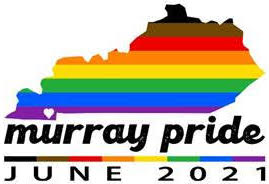As one of the Seven Deadly Sins, pride can be indulgent, overbearing, and inordinately self-impressed. When it refers to the month of June, however, Pride stands strong, chin up, because it means self-respect, dignity, and being part of a chorus of voices that upholds LGBTQ+ culture and rights.
This month, all over the USA, groups will celebrate Pride with parades, protests, drag performances, concerts, live theater, memorials, and celebrations of life for members of the LGBTQ+ community who lost their lives to HIV/AIDS. In Murray, Ky., plans include a parade, a picnic, and a gathering at Chestnut Park. The parade begins at 4 pm on Saturday, June 26, and the picnic will last to 8 pm.
Paige Rogers, one of the organizers, says it will be a lot of fun. There will be colorful attire, vendors distributing information and selling their wares, all sharing a sense of community in a rainbow of colors.
The history of Pride Month goes back to the early morning hours of June 28, 1969, when the police raided the Stonewall Inn, a gay bar in New York’s Greenwich Village. My childhood friend, Rick Shupper, lived in the neighborhood, catty-corner from the Stonewall, and he shared his memories of the onslaught.
“I was standing on the front steps of my building talking to a friend when all hell broke loose less than 100 yards away,” he said. “It went from a noisy fracas, to an insane mounting of police forces, and then increased resistance. That first skirmish set a tone that really did not diminish much over the ensuing 48 hours. EVERYONE knew there was no going back.”
Since then, the movement has found ways to move forward, even in the face of subtle forms of bullying, blatant discrimination, and outright violence. In rural areas like Kentucky’s Jackson Purchase, gays and lesbians are more likely to be in the proverbial closet than their urban counterparts, often to protect themselves and their families.
Growing up in Mayfield, Beau Mohon was a devout Christian who waited until college to come out. “I come from a Southern Baptist, fundamentalist background,” he explained.
Describing the atmosphere to be “non-affirming,” he remembers learning in Sunday School that interracial marriage was a sin. His home church dissuaded teens from attending college in Louisville because they would encounter undue influence from “gay, atheist Democrats,” Beau recalled.
He started college at Bellarmine in Louisville, a private Catholic university, but did not find it to be the best fit for him. “I didn’t know how to support myself mentally or emotionally,” he admitted.
Eventually, he transferred to Murray State University and was welcome at St. John’s Episcopal Church. He also did a stint at an Episcopal monastery and, working with people outside the monastic community, he gained maturity and some important insights.
“Just live your life,” he advised. “Let others see Christ in your life. Being a gay Christian is the best thing I can do.”
Also raised in a Southern Baptist family, Paige Rogers was born and raised in Calloway County. “Religion has been a struggle,” she confessed. “I was definitely scarred by it.”
“I didn’t come out until I was 23, and I was lucky to be able to gather support through a group of friends. Growing up around here,” she continued, I have my own experiences. But other people have had it worse.”
Paige mentioned friends who had been forced into conversion therapy.
In her own experience, Paige was abandoned by some of her loved ones, but there were family members who walked with her in Murray’s 2019 Pride march.
When our conversation touched upon the use of pronouns, Paige mentioned the importance of being explicit in their use. “It’s not something I have to think twice about,” she explained. “Pronouns are a sign of openness. Using them says something about a person’s character.”
Paige’s pronouns are she, her, hers, and she is quick to explain why a person’s preferences warrant respect. While admitting that use of they, theirs, them can leads to confusion when applied as an individual’s preference, she said, “Pronouns are a sign of openness. It takes effort on everyone’s part, but you have to adjust to the weight of what it means.”
A stickler for grammar, Paige Rogers claimed she will live and die by the Oxford comma, but also endorses use of “y’all,” an effective Southern term. “It’s inclusive and gender fluid,” she said.
More information about the Murray Pride celebration on June 26 is available on Facebook. Background on the history of Pride Month and the Stonewall Riots is available at www.history.com.









